American Airlines released a shareholder presentation supporting its positions on votes at the carrier’s annual meeting.
That means re-electing its slate to the Board, approving its auditor, and making corporate governance changes that allow amendments to certificate of incorporation and bylaws by simple majority vote. But the item that gets the most space is the non-binding advisory vote on CEO Robert Isom’s $31 million compensation package.

The board of directors, which approved the compensation, is very much related. The compensation is excessive not in the abstract (they point out that Delta CEO Ed Bastian has earned more) but because Isom’s performance hasn’t earned his.
The hallmark of this board is:
- Lack of airline experience. Former CEO Doug Parker, who largely built the board, called this out. Before adding former Northwest Airlines CEO (and Robert Isom boss) Doug Steenland to the board during the pandemic, they did not have a single director that had ever worked for an airline. Parker said, ” That has an impact on their deliberations and their ability to understand.”
- Lack of accountability. This is a backslapping board that never held the previous CEO accounting for destroying the company’s share price, destroying its employee relations, and destroying customer loyalty by degrading the product and service offered. There was no accountability for losing its primary partner in South America, or for underperforming its primary rivals.
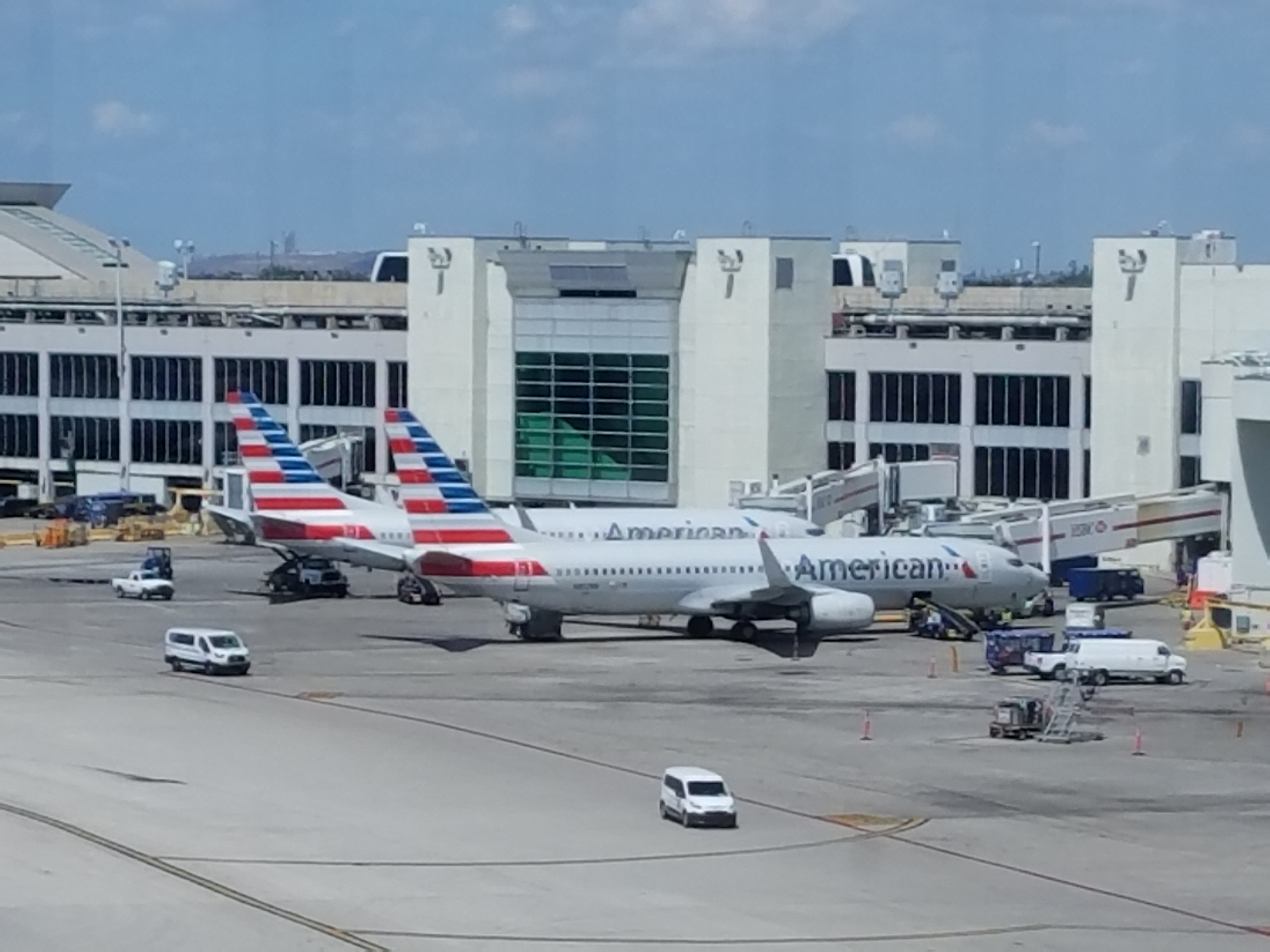
Interestingly, American seems to acknowledge the previous failings of the board though it’s unclear how they’ve actually improved upon in. They say that resignations and additions over the last four years “have strengthened the alignment of Board composition and skills with our long-term strategic priorities and bolstered the Board’s oversight capabilities.” While not obvious that they’re capable now, the company acknowledges their board was even less effective in the past according to American itself.
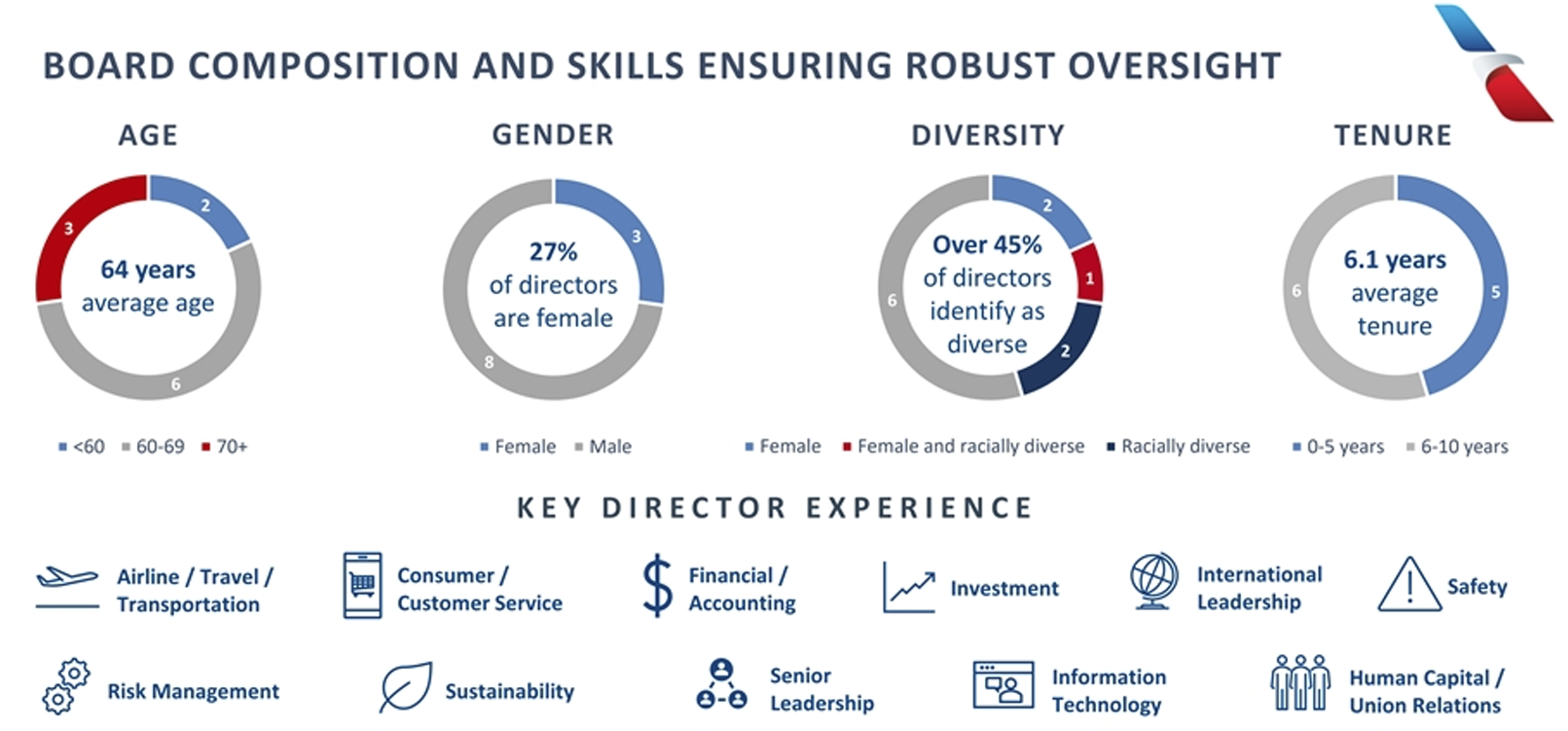
Former Northwest CEO Steenland is doing a lot of the lift here, and he beings union experience imposing wage cuts and layoffs while workers were told to consider dumpster diving to save money.
They also brag that they reversed their pandemic-era losses without noting that this is because people are traveling again when they weren’t then. American did not do this. In fact, according to filings regarding Isom’s compensation they have substantially reduced their financial goals so that a ‘home run’ is now $2.5 billion in profit when that had been below their projected average profit seven years ago, when inflation alone should mean 20% higher profit on a nominal basis.
Bizarrely, they justify the high bonuses paid out to Isom on the basis of the bonuses being outsized relative to his base compensation (the bullet points out that 91% of his total compensation was bonuses, to justify giving him large bonuses).
The fundamental problem though is that American Airlines is underperforming financially, and its shares have lost over half their value compared to prior to the pandemic. They have not gained anything over the past year. So what exactly are they paying for?
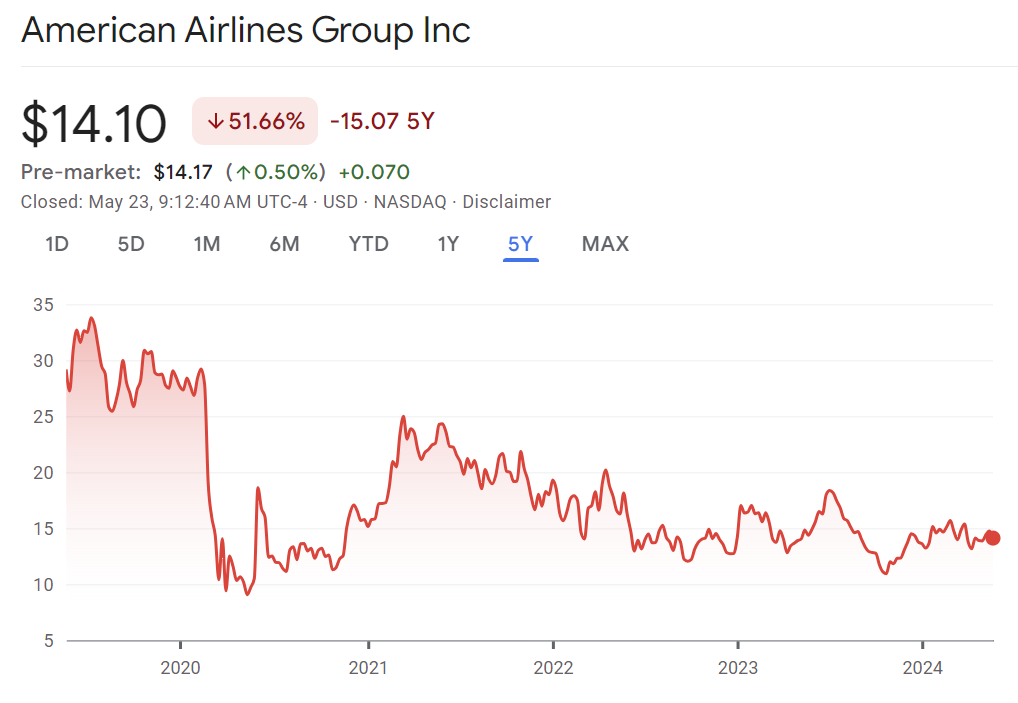
Moreover, Isom’s strategy isn’t generating profitability.
- He’s consistently pushed the line that they simply need operational reliability to perform financially. They’ve achieved huge gains in reliability but that hasn’t translated financially, because operational reliability is simply table stakes. They won’t make money without it, but customers won’t prefer them over other airlines that are also reliable.
- Instead of following a premium strategy that’s generated profits for Delta and United, his message to employees when becoming CEO was to cut costs. However American Airlines is and will remain a high cost carrier, which means they need to earn a revenue premium to be profitable.
- He’s allowed Vasu Raja to cut off managed corporate contracts and shed travel agents. The theory is they’ll fill planes either way, so why discount, and why incur higher distribution costs? But airlines like Delta and United are reporting big gains in high yield corporate business travel, while American is not. Raja explained that during the first quarter earnings call as the result of American’s weakness in coastal markets (Northeast, West Coast) but that too is a strategic failure.
There’s chart after chart to justify the pay – which underscores how much work the company needs to do to try to justify it. They cannot just say ‘American Airlines delivers outsized returns and creates greater shareholder value, so it makes sense to deliver strong compensation to the CEO.’ Isom himself stammered trying to justify it to employees even though he had prepared remarks.
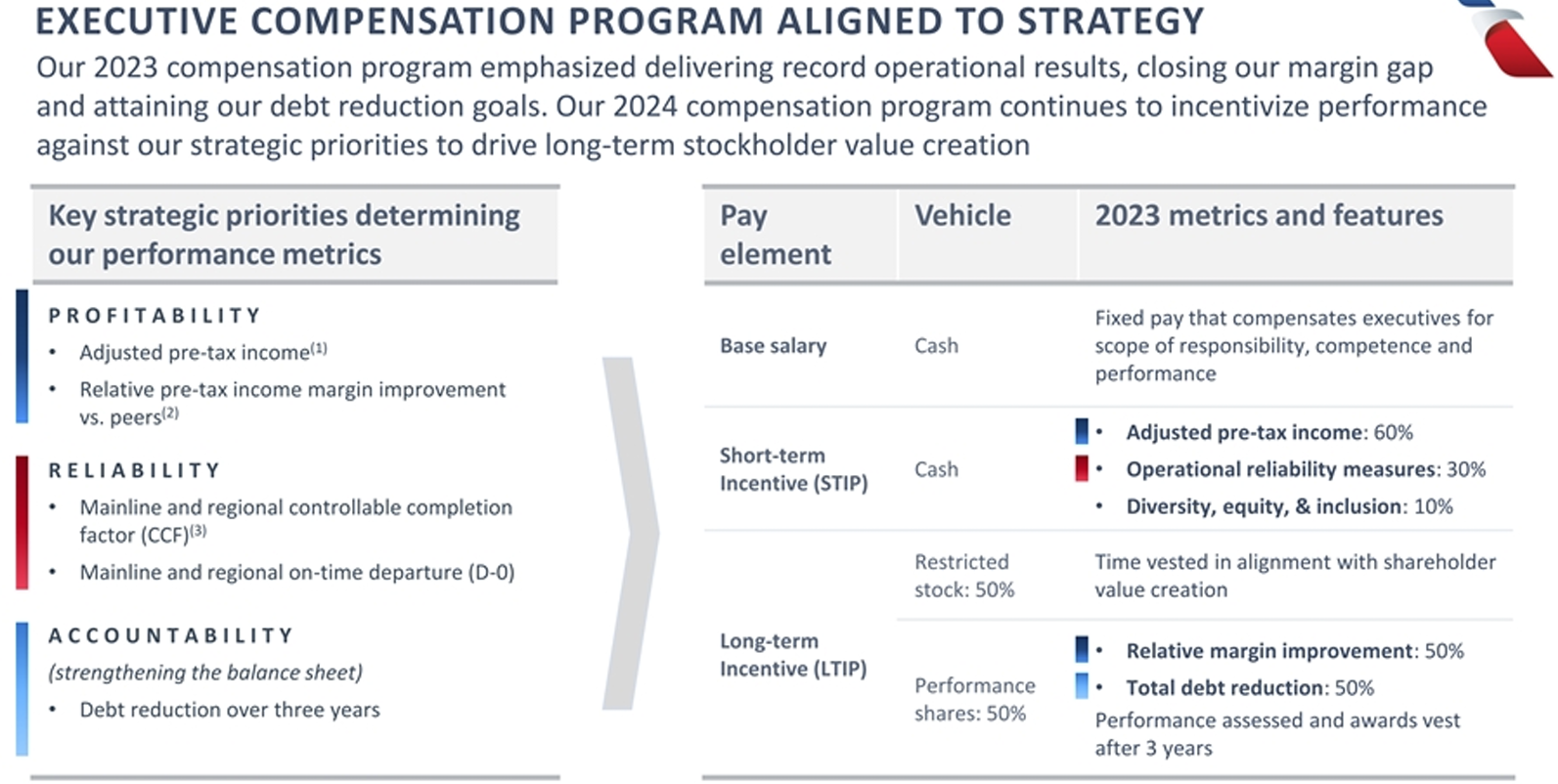
The problem isn’t ‘paying a CEO too much’. The problem is pay for lack of performance. And they’re doing it in a completely self-destructive manner. They need to close a flight attendant contract. The National Mediation Board has said that if a deal isn’t reached at the end of next week, they could release flight attendants to strike.
One of the most contentious remaining issues is retro pay – whether flight attendants will get make goods for raises they would have received over the period since 2019 when their contract became amendable but no new deal was reached (as Southwest flight attendants are being paid). Inflation has eroded their pay so much in the interim that first and second year Boston-based cabin crew qualify for food stamps.
- The Board is justifying Isom’s pay as retro pay!
- The reason he wasn’t paid more earlier is because it was illegal to do so
- This was a condition of taxpayer bailouts, which were delivered largely with the support of labor – and in particular flight attendants (Sara Nelson, who appears to want to raid American and gain representation of its cabin crew).
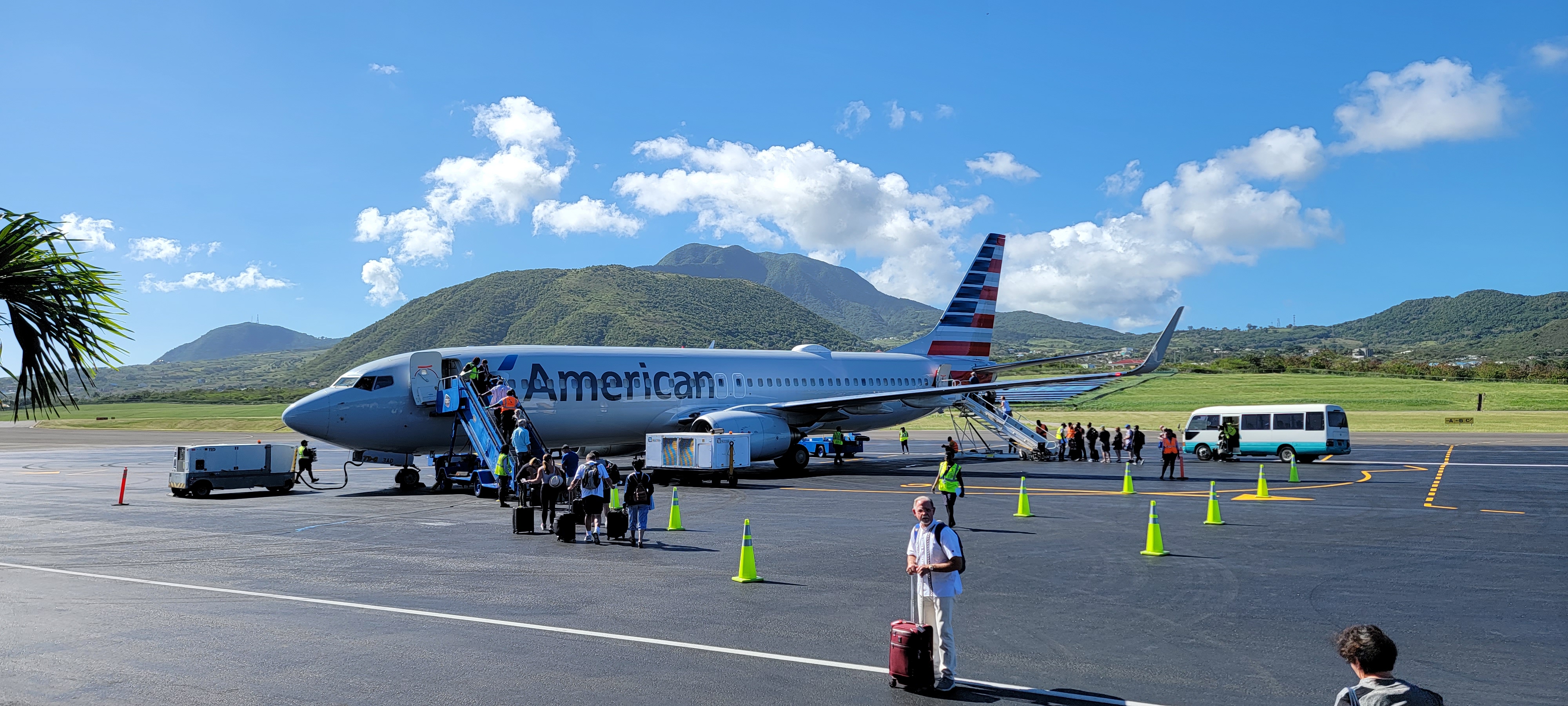
That makes it harder to get a deal done without retro pay, when he’s giving it to himself. Not delaying a decision on his own back pay until a flight attendant contract is done may cost the airline $200 million in additional labor expense. The very fact that Isom is taking this pay now, rather than later, demonstrates he doesn’t deserve it.
And the Board could easily have paid him less (1) based on merit, (2) based on Isom’s next-best alternative [he’s not being hired as CEO of Delta, United or Southwest], and (3) because if he left over pay he’s hardly irreplaceable – not so much better than the median airline CEO that American couldn’t afford new leadership.


Any company that pays any employee, regardless of position, more than 10 times the average salary of all it’s employees ought to be shunned and boycotted.
Isom is just paid too much for doing too little.
AA needs an activist shareholder with a Board seat, OR, an effective Chairman.Better, both.
Wahhh. If you want to advance and make more money, then get some education and find a job you can move up in, instead of staying in the same unskilled labor FA job with no possibility of advancement while demanding more and more money to do worse and worse of a job every year. Other people making more money is not a reason for you deserving more money. US FAs are among the most entitled, selfish and all around most terrible people on the planet… except for Hamas loving leftists.
Welcome to corporate greedy America
Thanks for your comment above Mantis…”stay in the same job with no possibility with no possibility of advancement while demanding more and more money to do worse and worse of a job every year. Other people making more money is not a reason for you deserving more money.”
This seems to describe Robert Isom’s compensation situations to a T.
If he was any sort of “leader of men”, he would simply take $1MM and forgo the rest until the employee issues are settled and the airline returns to profitability.
The “right” person as CEO of a firm this size will make many, many times more net income than $31 million as compared to an “OK” CEO. I am not stating RI is “right” or “OK.” This issue is like complaint about House and Senate salaries. I’d gladly have us pay them $1 million/year IF they got the job done. It’s not the pay it is the performance. A succesful CEO of a large corporation deserves to earn as much as an NBA star. (And, if that is more than 10 times what a average employee makes, that is fine. A good CEO is very beneficial to all employees.)
$32 million for any CEO is simply unconscionable, especially when so many employees are paid peanuts and struggle to pay for the basics.
@Mantis,
Because your reading comprehenion is as pathetic as you are, I will explain the gist of the article.
1) Isom is an incompetent moron. You can probably relate.
2) As such, he is overcompensated
3) This is particularly unfortunate as Murikan’s Frontline employees qualify for food stamps while this buffoon is collecting $31 million in ‘unearned’ income.
As a sidenote, I feel bad for you. You couldn’t get a date with a flight attendant, let alone a dog catcher. So you sit all alone in your mother’s basement whacking incoherently on a computer keyboard.
Sucks to be you.
@Mantis — I’ve had my fair share of unfriendly and lazy FAs, but I would love to see you work for peanuts, only be paid when the plane pushes back from the gate, and then deal with the unruly, rude, and entitled American flyers. I bet you’d have a different outlook.
AAL also spent about $12 billion buying back its stock at vastly higher share prices than what it’s trading at today while borrowing money to do so.
Talk about throwing good money after bad. The corporate rot is high and he doesn’t deserve most of what he gets. He’s created zero value for shareholders, nor has the board since the mid 2010s.
Who knew that getting rid of the old experienced AMR/LAA Board was a bad idea? Parkers cronies apparently did.
Isoms pay and AAs current situation reminds me of 2003.
Why did the BoD or anyone in management think that firing the sales team was a good idea? Stop drinking Vasu Rajas Kool-Aid and get it together.
@K Helldoge – pretty harsh (even if deserved) What set you off?
Thank you. As a retired employee, I appreciate you calling this Board out for what is essentially robbing the company to enrich an undeserving CEO. Many of us long for what we sometimes call “the real American Airlines”, and think that the deal brokered to push out Mr. Arpey and take the company through Chapter 11 was the beginning of a long descent into poor service to customers and unfair treatment of employees.
@Mantis clearly has a mental problem.
I always thought Parker (Former CEO) was the worst thing that ever happen to American Airlines. Now Robert Isom is running a close second and gaining.
When everything is falling apart in a big company ,all the employeeds are furious ,planes old ,delays ,and manegent don’t care ???what will whappen ???
Isom is a mouthpiece without any real idea what to do. Why would you promote the coo of the worst operational airline to ceo?
The airline these days is run by the former US Airways cfo, Devon May, which shows in just about every aspect of AA.
I’m amazing Gary hasn’t talked about Vasu’s “sabbatical”
Sorry. Amazed
I thought Parker (Former CEO) was the worst CEO in American Airlines history. Now Robert Isom is soon becoming a close second and gaining, Isom got his 31 million dollars salary/bonus and now may be a good time for him to resign or be fired.
For the opportunity to work for premium pay, consider employment with Delta.
A fish rots from the head. (Old Chinese proverb.)
This should be published in every newspaper in the country. This is corporate greed at its finest. One point I would like to make is that the pilots and ticket and gate agents all received retro in there latest contracts. Flight attendant’s are the face of an airline. Fire this CEO and get someone that can bring the airline back to being great.
American flight attendant are largely bitter, surly, entitled and combative. They seem to thrive on creating chaos in the cabin and triggering combative interactions whenever possible. The toxic environment they create in the cabin because of the resentment they have towards American is a contributing factor in unruly passenger incidents. Please feel free to quit. Your attitudes aren’t needed on my flights.
I’m afraid I side with the FA’s. AA needs to create a better environment for employees and passengers to succeed. The current methodology only works to better DL.
As a current employee, I can honestly say that anyone who’s not a pilot with AA is undercompensated when compared with AA peers. From maintenance to gate agent to ramp. Industry wide, the gate and ramp employee is still vastly underpaid no matter what airline . As for the “move up” comment by Mantis, I have gotten the degree and moved up, and I am still struggling to feed my family. The only route higher is to wait for an opening and commit myself to being available 24/7, 365 for no overtime so that those in the crystal palace in DFW can feel like they are in touch with the operation. So, my choice is feed my family and not see them at all, or keep struggling and have time with them. Some choice.
I’m impressed. Isom and his stooges have done an excellent job making me pro-AA FA union. They should strike and add one more demand: Isom needs to go, and the board needs to turnover 100% within a few years.
The FA union is a much better union than the CWA the Gate Agents and Res Agents have. CWA has lied to the Agents over mandatory OT, no support for Agents boarding flights alone, and the list goes on. The FA make twice the money as agents. Yes, they have less hours to work, but working 1/2 the hours is sweet. Why is nothing offered to agents for lack of compensation..like the poverty level.
I’m not saying there is one group better than the other. I would like people to see agents need support too.
How does Robert Isom earn $31,000 ,000.00 while some full time “team members” are on food stamps? The guy (Isom) should be ashamed to treat his staff without salary increases for 5 years!
Former US Air and former Northwest people on the board or in management means this airline will be gone in five years time. Good riddance. Hopefully Southwest will be purchasing the planes and routes they want when American is on the chopping block, minus the employees.
FA’s stop your complaining. If you don’t like your pay, get another job. Just because someone else with magnitudes of order more responsibility makes more than you, does not mean you deserve more.
Flight attendant only work very little hours it is not correct to represent them with their hourly rate and benefits. They should work more then they would.not be on food stamp. 100he a month is part time jobs.
I’m a regional flight attendant who started doing this job at an age when most people retire. It’s a fun job most of the time, and no, it’s not (usually) grinding labor, but it is a job. I don’t complain too much about my pay- which is even lower than that of mainline FAs-because having a positive mindset is essential to thriving in this job. However, I also don’t have to live on the pay alone. I have savings and a husband to round things out. If I DID have to live on FA pay alone, I couldn’t do the job.
FAs do not have a super technical skill set, but the job is work! It requires stamina, emotional intelligence, and the willingness to live away from home a good part of the time, among other qualities Those things should he compensated more generously than they are, especially for newbies. I don’t think we should earn six figures to start, but food stamp eligibility is not okay. Do you want your flight attendant to be constantly worrying about whether they’ll be homeless next month while doing preflight safety checks or assessing passengers for fitness to fly or responding to medical emergencies, along other things? If not, then pay us fairly!
At my airline, most new FAs make about $25k a year flying what is essentially equivalent to a full time job. That’s not a living wage by any stretch of the imagination. It’s not right.
As usual, your criticisms of AA management are overwrought. Isom is doing a good job and I am certain AA will close the profitability gap with its major competitors (for reasons both within the control of managment and for dumb luck like having hubs in the most thriving economic areas of America).. I’m agnostic as to his compensation: obviously, it’s easy to say that almost every S&P500 CEO is “overpaid.” That said, I do agree that it’s stupid to have a Board of Directors will little useful knowledge of the business. This isn’t uncommon, of course, but it is stupid. I also think AA management should do more to look after the interests of their shareholders, and managerial compensation should be more effectively linked to actual shareholder returns. If anyone has gotten shafted at AA in recent years, it is its shareholders. Employees — and customers — seem to be doing much better than the owners.
Being the largest airline in the world is very hard and difficult to be always on top of everything and every piece of news!
Being overpaid is a lack of work from the BoD !
I think every worker should be paid decently and with the inflation soaring like it is now we need to rethink this modus operandi ! The Company needs to cut cost and rely more on a good BoD than on the CEO ! He is not GOD and will not solve the problem, just get richer and richer while other workers are relying on food stamps ! UnFBelievable !
I love all these people that just say get another job. We’ll when you’ve dedicated day 30 yrs at a company, it’s just not that easy to say “well, I quit. Bye” Easier said from the outside looking in people. You have absolutely no clue nor will you, if you’ve never worked for an airline. So SHUT UP. No matter the job, how’d you like it if whatever job your in that you’ve pretty much dedicated your life and money to retirement plans that your company say slashed your pay by 80%. You gonna up and just leave or fight? Dedication to a company goes a long way. I think it boils down to actually how much you love your job, it’s just management.
@Yoi – all you’ve done here is show that you have no business spouting opinions on the matter since you don’t understand the most basic fact about FA work. “100 hours” a month simply means 100 hours on a moving plane. It includes *magnitudes* of uncredited and unpaid time at work. So maybe learn even the most basic facts before flying around your embarrassing judgements and opinions.
When one looks at the compensation for American’s CEO and those of his peers, he is wildly over compensated based on customer satisfaction and employee morale. In my humble opinion, part of the problem is stupidity. Ignorance can be fixed. Stupidity is forever. There appears to be no constructive interaction with the workers…the people who actually RUN the airline. Instead, it’s grousing back and forth with unions which are fighting each other to gain the upper hand against management instead of the common goal of providing the best customer experience regardless of the worker’s position. Then look at Delta’s situation. Because Ed Bastian and those below him constantly enforce “do what is right”, Delta succeeds in many ways. The Delta employees are treated with respect and paid accordingly. One can grouse, “…well XXX pays more per hour…etc.” How many major airlines paid a 10.4% profit sharing OUT OF THE BLUE followed by another across the board 5% raise only a few months later? So when looking at executive compensation, one must look at the overall picture. Delta’s CEO earned his salary. Isom, on the other hand, did not! Also note, like many large companies who may outsource some positions, those salaries and compensations are not figured in and shouldn’t be.
One can only hope that the Board will eventually see what is painfully obvious – the current strategic plan is not working.
@Yoi and @Mantis you both have NO idea of the responsibilities and overall Job of a flight attendant, educate yourselves before commenting. I hope many travelers get the opportunity to read the above article, it’s just about spot on. The Board and CEO feel that they are “entitled” this money for seeing the “Company through Covid”. It was the tireless efforts of the WORKERS, masked up and dealing with passengers and cargo on the daily, showing up getting the job done. Flight Attendant have earned a substantial raise as well as back pay and a reinstated amount of sick pay. Due to numerous factors, such as the delay of a timely negotiated, fair and equitable contract, management kicking the can down the road and the NMB holding back the power of the Unions to be released into a cooling off period and Unions unable to flex their ONE power, a STRIKE. This all could be a non issue if wealth weren’t just lining the pockets of the CEO club.
“Let them eat cake”…oh, sorry, with their earnings FA can not afford cake!
Disgusting corporate excess at its best.
1, blame the board, they approve this. 2, take his $31M, divide it by 130,000 employees, they all get a $238 payment. So stop with this nonsense. Is he overpaid, probably. But his pay doesn’t affect the employees like the “experts” here think it does.
The American Airlines board of directors made a grave mistake when they, in essence, compelled Scott Kirby to leave AA. Of course, the board and even many employees didn’t think so at the time, many laughed at United when they took on Kirby. United is in a much, much stronger position than AA with Kirby at the helm.
The current contract conditions were reached by an agreement between the flight attendants union and the management of American Airlines. If new flight attendants are struggling to pay their bills in some cities, both of those parties are at fault for making such a feudal agreement. You cannot heap all of the fault on one party while holding the other party blameless. I would prefer that senior flight attendants have less of a percentage increase on the new amendments when they are ratified with the money going instead to greater increases of pay for those with only a few years or less on the job. I’m sure that won’t happen so the situation, a form of hazing, will continue.
I’m not arguing the compensation part of this story at all (I’m not certain that any human being needs $31m/year), but I did not see how much of the compensation if any, is based on stock price.
Also I thought it amusing in the section of the article regarding Accountability. Most, if not all of the failings pointed out in that part were on Parker when he was in the position. And now he’s on that BOD who approved Isom’s comp package.
The old America West gang is taking AA in the same crappy direction that US Airways was taken.
Do you BLAME any employee group at American AIRLINES for HATING their CEO other than the PILOT GROUP??? DO YOU??!! I’m an EP with AA and I have spoken to many for the flight attendants, agents and club representatives who are absolutely wonderful at what they do and have ALWAYS taken care of me, even though at times their hands are tied and they just can do it because they are all being watched and will get in trouble or issued disciplinary action or terminated. Speaking for the flight attendants, it is 100% to only take care of the pilot group at AA and NOT all other employees at AA. I will continue to fly AA because of their employees and NOT the executives or CEO. Oh and the reason he is NOT let go is because the BOD approves his decisions because whatever they do NOT give the employees, the BOD will benefit and so do the executive team. Shame on this one great airline!
To all of you who like to blame the flight attendants for the current toxic environment at AA: “A team is only as strong as its leadership”. Isn’t that like MBA 101? The pilot’s union recently expressed concerns over safety of the planes in the interest of “on time departures” the executives get bonuses on. For the flying public’s sake, I hope you all don’t finally see the corporate greed at play here only in retrospect. It’s very rich to take your anger and frustration out on the flight attendants working for pennies instead of those “leaders” making trip-to-the-moon money to sink this ship.
I use to travel from GNV TO ERI a lot. Now the airfare is so ridiculous I can’t afford it. Low-fare flights are harder to get to and from but is a lot cheaper. Hope someday AA lowers their flights and I can fly AA again.
I saw this coming in 2013..I could write a book. I’m a 25yr retired former employee. I saw this coming.. LOL Please don’t talk to me about this despicable amount of money this merger created… I’m speechless.
No wonder my flight from RIC to MIA has skyrocketed from the original $100-$150 to its now current rate of $500-800.
I just want to say that I’m a United employee and I really like working for Scott Kirby. It’s a great working environment.